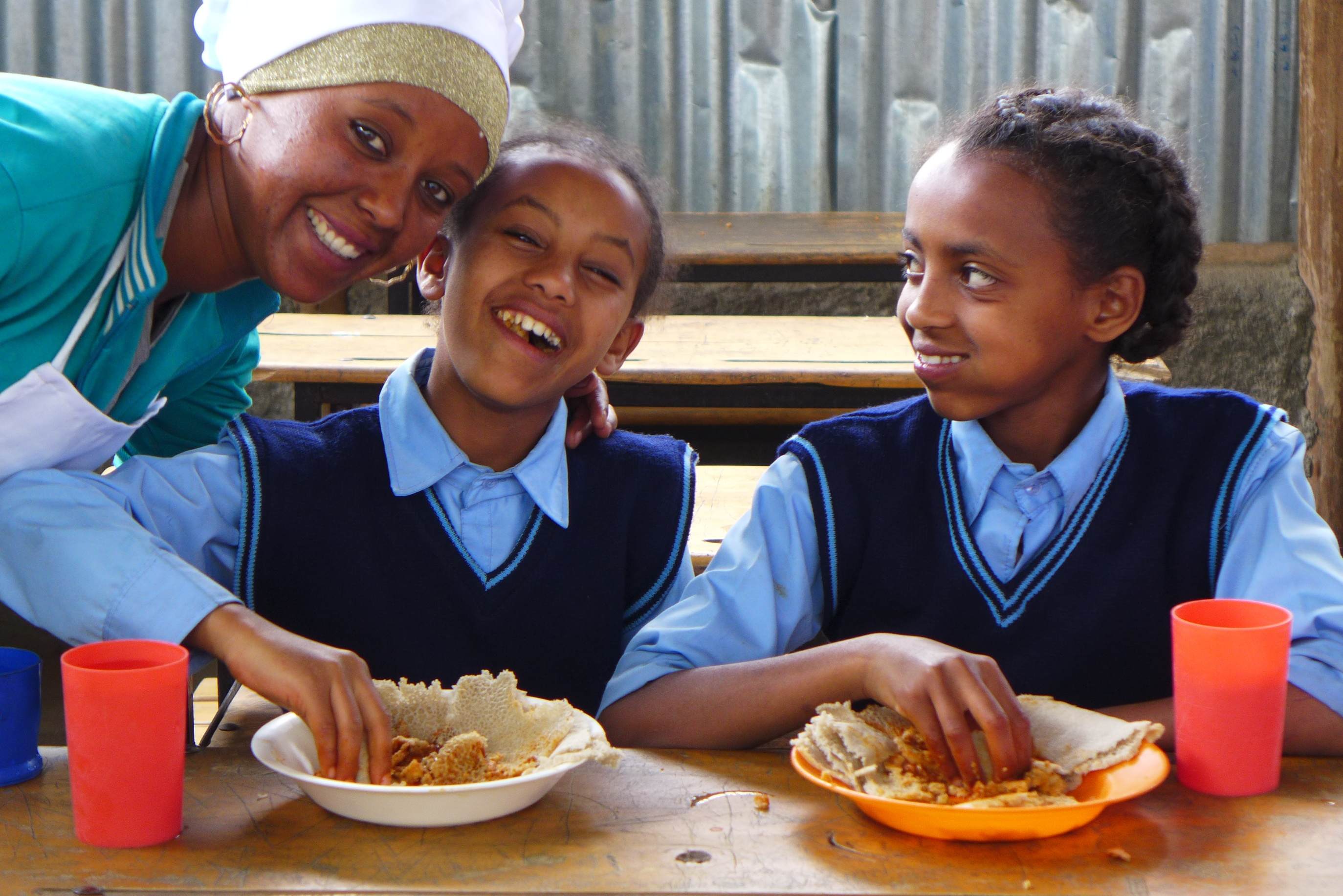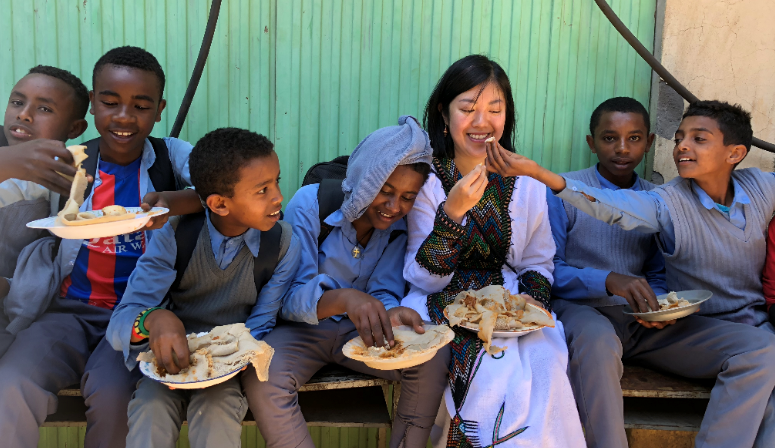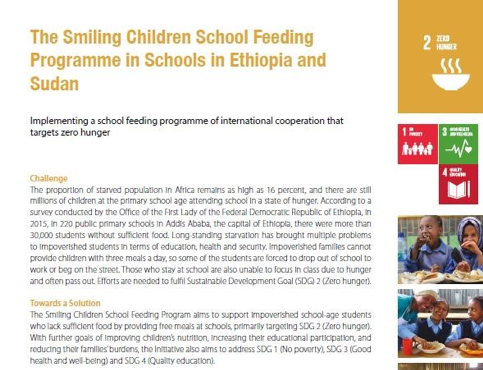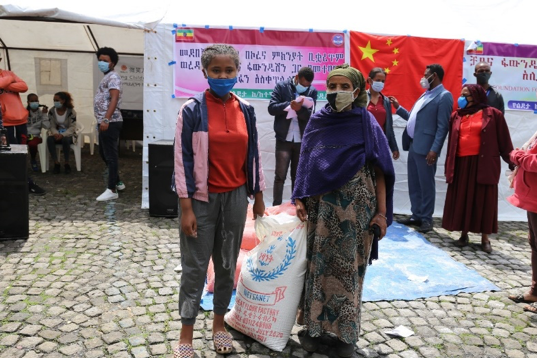Ethiopia - Smiling Children Program
Smiling Children Program(School Feeding)
Background
Goal 2 of the UN’s 17 Sustainable Development Goals (SDGs) is zero hunger. Around 16 percent of the African population suffers from hunger. In some regions of the continent, hunger rates can be as high as 30 percent. Hunger rates are particularly acute among children. Around 66 million primary school-age children across the developing world attend class on an empty stomach, with 23 million of those children living in Africa alone. According to a survey conducted by the Office of the First Lady-Ethiopia, more than 30,000 students across 220 public primary schools in the capital city of Addis Ababa do not have enough food to eat. These poor students mostly come from single-parent families, live in poverty, are orphaned, disabled or affected by HIV/AIDS, or have been forced to live on the street due to abandonment by families unable to support them. Families living in poverty are usually unable to provide their children with the necessary three meals per day. Such hardship often forces children to drop out of school so they can beg on the streets for food and money. Meanwhile, those children whose parents are able to keep them in school find themselves unable to concentrate in class, as they still are not getting the necessary amount of nutrition. There have also been reports of children passing out in class due to not eating enough. Clearly, hunger poses a major challenge to children’s health and educational attainment in Ethiopia.
Taking inspiration from its long-standing and successful Nutritious Meals Program in China, the CFPA paired up with the Ethiopian government and local NGOs to launch the Smiling Children Feeding Program. By supplying primary schools across Addis Ababa, Somalia State, and Oromia State with healthy school meals, the program aimed to meet the nutritional needs of children from impoverished families and in turn improve their health and delayed growth problems.
Intervention
The Smiling Children Feeding Program is a localized international cooperation program designed by the China Foundation for Poverty Alleviation. The program has facilitated strong cooperation efforts among the foundation, various donors such as Lingshan Charity Foundation and Alibaba Foundation, the Ethiopian government, and local NGOs. The official launch date of the program was May 26, 2015. As of December 2019, 23,621 students in over 50 public schools in Ethiopia haven been provided with school meals under the Program.


Results
The Ethiopia Smiling Children Feeding Program has produced a number of positive tangible outcomes:
1. Improved school attendance and performance: Following the introduction of the program, more children across Ethiopia have been staying in school, demonstrating that the provision of healthy and nutritious schools meals can have a significant positive impact on children’s class attendance. Increasing school attendance across the city means children are less likely to turn to the streets to beg for money and thus less likely to face the perils of child exploitation. Furthermore, children who have benefited from the hunger relief program have become more attentive in class and achieved better grades.
2. Improved child physical and mental health: By providing nutritious food, the program has drastically improved children’s health and growth and boosted their immune systems. As a result of having healthier and happier children, parents are no longer having to face the prospect of having to pay for hospital bills and therefore are no longer having to face the prospect of living in absolute poverty.
3. Improved child protection: As noted earlier, families living in poverty in Ethiopia are often unable to provide their children with three meals a day, causing many children to drop out of school in order to beg for money on the street, or work for food. Street children are vulnerable to various forms of exploitation and violence, such as child prostitution and gang recruitment. Keeping children in school by providing them with enough nutritious food means they are able to avoid the dangers that street begging brings. In turn, their rights and security are protected.
4. Improved employment opportunities for local women: In addition to benefiting impoverished children, the program has also provided employment opportunities for the mothers of the children, with each public school providing between 30 and 50 jobs for these women. The program has enabled women to earn a better income and therefore reduce levels of poverty for themselves and their families. Importantly, the program has enabled these women to learn cooking skills, catering management skills, warehouse management skills and team-building skills, thus leading them to future and further job opportunities. In addition to achieving the further implementation of SDG Goal 2, this outcome has thus also helped Ethiopia further implement SDG Goal 5 on gender equality and women’s empowerment.
Lessons learned
1. Promoting women’s participation in local hunger relief programs can improve and diversify their job skills such as food management and create future employment opportunities. Collaborating with local non-governmental organizations enables international stakeholders to better understand the local context. By partnering with Ye Enat Weg Charitable Association, China Foundation for Poverty Alleviation was able to connect with women living in poverty and provide them with sustainable career development opportunities. Otherwise stated, collaboration with local stakeholders can economically empower women from poor backgrounds, provide locals with decent salaries and bring employment avenues to the unemployed. Furthermore, engaging women in hunger relief programs can boost their enthusiasm for local charitable and humanitarian initiatives, all the while teaching them about food management and safety.
2. Implementing international humanitarian programs requires strong cooperation with local stakeholders. In order to ensure the sustainability and effectiveness of international humanitarian projects, it is crucial to foster strong cooperation with local institutions and non-governmental organizations, as these are the stakeholders who understand local situations better than anyone else and know how to best meet the needs of local populations. Put simply, local stakeholders are able to shape and implement international projects within the localized context. This is why it was crucial for Chinese stakeholders to meet with a number of Ethiopian government agencies, charitable organizations and schools before the Smiling Children School Feeding Program was launched, so they could fully grasp local conditions and needs. This project has also demonstrated the necessity of sustaining cooperation with local actors throughout the implementation stage, so as to ensure the monitoring and smooth execution of desired outcomes.

The Smiling Children Program was included in Volume 3 of Good Practices in South-South and Triangular Cooperation for Sustainable Development by the United Nations Office for South-South Cooperation
Smiling Children Program(Food Distribution)
In response to the issue of hunger faced by children in poverty-stricken areas in some developing countries, China Foundation for Poverty Alleviation launched the Smiling Children Program in 2015, benefitting 66,361 students by 2020. By either provision of school meals or food distribution, the project aims to facilitate the well-being and development of children in hunger and contribute to beneficiary countries’ fulfillment of SDG2 Zero Hunger. The Program also conveys the spirit of friendship of Chinese people and promote people-to-people connectivity. In 2020, the Smiling Children Program has been implemented in six countries, including Ethiopia, Nepal, Myanmar, Cambodia, Laos, and Pakistan.

Beneficiary student in Ethiopia receiving food package
